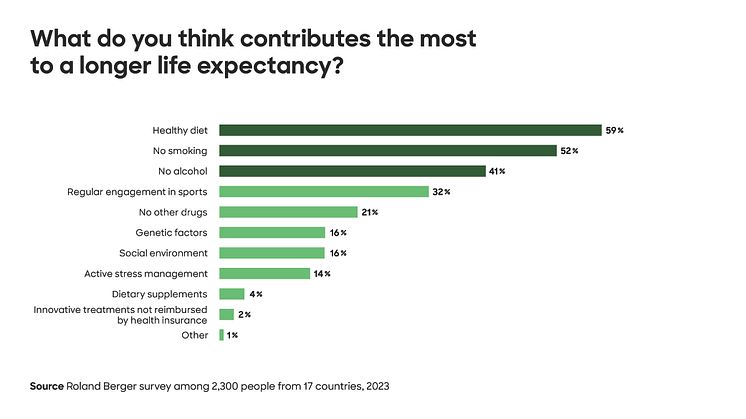
Press release -
Booming market: Longevity gains traction in the healthcare sector
- The global market volume for products and services to promote longevity is already around 30 billion US dollars
- Forecasted annual growth of five per cent until 2033
- Consumers are prepared to pay out-of-pocket for innovative healthcare services
Munich, November 2023: In the healthcare sector a new market emerges that is defined by innovations not specifically designed to cure diseases, but to extend healthy life expectancy overall. If this specific longevity segment is distinguished from the established healthcare markets, the global market volume is already around 30 billion US dollars. If the traditional regulated healthcare market and the self-pay market were also included, the global volume would be around USD 17.5 trillion and rising: the latest edition of Roland Berger's "Future of Health" study series forecasts annual growth of around five per cent until 2033. More than 2,300 people from 17 countries, including Germany, Austria and Switzerland, were surveyed to analyse consumer attitudes to these offers.
"The term longevity reflects a change in perspective in medicine - away from reactive treatment and towards a preventative approach to improve the quality of life of the individual. In the past, curative treatment of life-limiting diseases was usually the focus. But today, measures and innovative methods that extend our lifespan are becoming increasingly important," says Oliver Rong, Partner at Roland Berger.
Highest confidence in traditional approaches
However, the results of the "Future of Health" study show that confidence in these new treatment methods such as cell and gene therapies still needs to develop: 74 per cent of respondents stated that they prefer preventative measures such as regular exercise to weight loss medication. Rather than pharmaceutical preparations, the survey participants cited a healthy diet (59 per cent), not smoking (52 per cent) and not drinking alcohol (41 per cent) as the decisive factors for a longer life. "In recent years, many innovations have come onto the market in the form of fitness trackers and smart watches in combination with digital services. They have been quickly adopted by consumers, partly because many of these innovations promise to increase their regular activity levels and thus improve their health. In contrast to these low-threshold offers, new therapy options still need to build up the necessary trust," says Ulrich Kleipaß, Partner at Roland Berger.
Consumers invest in their health out-of-pocket
In fact, 50 per cent of the consumers surveyed stated that they would use new treatment methods such as stem cell therapy if their effectiveness was scientifically proven. Trust is also an important factor with regard to the players in the healthcare system. Doctors, hospitals and pharmacists enjoy the best reputation here: their recommendations also carry by far the most weight with patients when it comes to longevity. In order to lead a healthier life, there is also a willingness to pay for services that are not covered by health insurance. This applies not only to preventive check-ups, but also to innovative medicines or nutritional programs.
"Longevity is a trend that affects both the traditional healthcare market, where services are reimbursed by insurance companies, and the segment of privately financed healthcare products and services," says Rong. "All established players in the healthcare sector must therefore face up to this and develop strategies to deal with the growing trend."
Topics
Categories
Roland Berger is the only management consultancy of European heritage with a strong international footprint. As an independent firm, solely owned by our Partners, we operate 51 offices in all major markets. Our 3000 employees offer a unique combination of an analytical approach and an empathic attitude. Driven by our values of entrepreneurship, excellence and empathy, we at Roland Berger are convinced that the world needs a new sustainable paradigm that takes the entire value cycle into account. Working in cross-competence teams across all relevant industries and business functions, we provide the best expertise to meet the profound challenges of today and tomorrow.




